Thomson Surname Ancestry ResultsOur indexes 1000-1999 include entries for the spelling 'thomson'. In the period you have requested, we have the following 2098 records (displaying 51 to 60): Single Surname Subscription | | | Buying all 2,098 results of this search individually would cost £12,002.00. But you can have free access to all 2,098 records for a year, to view, to save and print, for £100. Save £11,902.00. More... |
These sample scans are from the original record. You will get scans of the full pages or articles where the surname you searched for has been found. Your web browser may prevent the sample windows from opening; in this case please change your browser settings to allow pop-up windows from this site. Scottish litigants, rebels and cautioners
(1545-1569)
The Privy Council of Scotland exercised a superior judicial authority in the kingdom, and consequently received and dealt with a constant stream of petitions, as well as dealing with the internal security of the state. This register of the council from June 1545 to July 1569, in the reigns of Mary queen of Scots and king James VI, was edited by John Hill Burton, Historiographer Royal for Scotland, and published under the direction of the Lord Clerk Register of Scotland in 1877. Some of the individuals mentioned are the complainants, those of whom they complained, and the sureties on both sides: at this period, some of the complainants are alleging serious attacks, often of a feuding nature. Many of the bonds entered into by the cautioners are promises to keep the peace towards such enemies. Failure to answer to the council when summoned was a serious contempt, leading to being denounced a rebel, with serious consequences. But 'horning' was also used in the pursuit of debts: there was no imprisonment for debt in Scotland, but a creditor could have an obstinate debtor ordered, in the sovereign's name, to pay what was due, failing which, the debtor could be put to the horn, denounced as a rebel, and imprisoned as a rebel. In his preface to this volume, Burton remarked that "There might perhaps be objections to the abundance of names of persons and places unknown to fame; but it was considered that in such a work the proper names of all persons and places occurring in the Register should be preserved, to be at the service of genealogical as well as historical investigators".
THOMSON. Cost: £4.00.  | Sample scan, click to enlarge

| Inhabitants of Aberdeen
(1398-1570)
Extracts from the first 27 surviving volumes of Aberdeen burgh (borough) records were made by John Stuart for the Spalding Club and published in 1844. Although it is believed that the town records were preserved on parchment rolls until about 1380, and in book form thereafter, by 1591 the town clerk remarked that there existed of the earliest records only 'peces and partis of four ald imperfyt and informall buikis conumitt and eitten be mothes, for aldnes and antiquite euill to be red, yit to be keipit for a monument be resoun of the antiquite'. The regular series of books surviving comprised 61 folio volumes from 1398 to 1745, and these contained the proceedings of the Council of the Burgh, of the Baillie Court, and the Guild Court.THOMSON. Cost: £4.00.  | Sample scan, click to enlarge
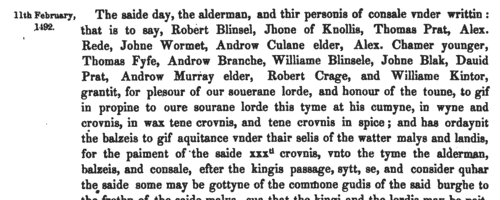
| Liegemen and Traitors, Pirates and Spies
(1558-1570)
The Privy Council of queen Elizabeth was responsible for internal security in England and Wales, and dealt with all manner of special and urgent matters
THOMSON. Cost: £4.00.  | Sample scan, click to enlarge
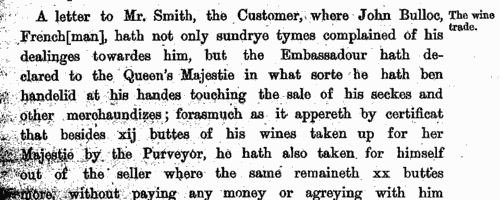
| Scottish litigants, rebels and cautioners
(1569-1578)
The Privy Council of Scotland exercised a superior judicial authority in the kingdom, and consequently received and dealt with a constant stream of petitions, as well as dealing with the internal security of the state. This register of the council from July 1569 to June 1578, in the reign of king James VI, was edited by John Hill Burton, Historiographer Royal for Scotland, and published under the direction of the Lord Clerk Register of Scotland in 1878. Some of the individuals mentioned are the complainants, those of whom they complained, and the sureties on both sides: at this period, some of the complainants are alleging serious attacks, often of a feuding nature. Many of the bonds entered into by the cautioners are promises to keep the peace towards such enemies. Failure to answer to the council when summoned was a serious contempt, leading to being denounced a rebel, with serious consequences. But 'horning' was also used in the pursuit of debts: there was no imprisonment for debt in Scotland, but a creditor could have an obstinate debtor ordered, in the sovereign's name, to pay what was due, failing which, the debtor could be put to the horn, denounced as a rebel, and imprisoned as a rebel.
THOMSON. Cost: £4.00.  | Sample scan, click to enlarge

| Scottish litigants, rebels and cautioners: excluded names
(1569-1578)
The Privy Council of Scotland exercised a superior judicial authority in the kingdom, and consequently received and dealt with a constant stream of petitions, as well as dealing with the internal security of the state. This register of the council from July 1569 to June 1578, in the reign of king James VI, was edited by John Hill Burton, Historiographer Royal for Scotland, and published under the direction of the Lord Clerk Register of Scotland in 1878. Some of the individuals mentioned are the complainants, those of whom they complained, and the sureties on both sides: at this period, some of the complainants are alleging serious attacks, often of a feuding nature. Many of the bonds entered into by the cautioners are promises to keep the peace towards such enemies. Failure to answer to the council when summoned was a serious contempt, leading to being denounced a rebel, with serious consequences. But 'horning' was also used in the pursuit of debts: there was no imprisonment for debt in Scotland, but a creditor could have an obstinate debtor ordered, in the sovereign's name, to pay what was due, failing which, the debtor could be put to the horn, denounced as a rebel, and imprisoned as a rebel. In his preface to the first volume, Burton remarked that "There might perhaps be objections to the abundance of names of persons and places unknown to fame; but it was considered that in such a work the proper names of all persons and places occurring in the Register should be preserved, to be at the service of genealogical as well as historical investigators". But by this, second, volume, he decided that complete coverage was impractical, with "the crowding in of proper names, all but a few being the names of obscure persons ... Borderers are called up in considerable groups, and ordered to find, or recorded as having found, sureties for giving compensation to persons plundered, or for good conduct for the future. Several burgesses are sometimes entered in a minute about a Corporation quarrel. When the particulars of unimportant private litigations are omitted, the names remain." He therefore devised this 'Index of Names excluded from the Text', giving name, conditions, and date in register.
THOMSON. Cost: £4.00.  | Sample scan, click to enlarge

| Liegemen and Traitors, Pirates and Spies
(1577-1578)
The Privy Council of queen Elizabeth was responsible for internal security in England and Wales, and dealt with all manner of special and urgent matters
THOMSON. Cost: £4.00.  | Sample scan, click to enlarge
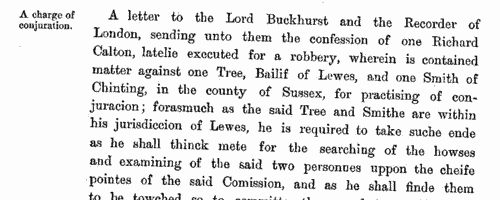
| Official Papers
(1547-1580)
The State Papers Domestic cover all manner of business relating to England, Ireland and the colonies, conducted in the office of the Secretary of State as well as other miscellaneous records.
THOMSON. Cost: £4.00.  | Sample scan, click to enlarge

| Tenants of the Bishop of Durham
(1580)
'A Booke of Surveighe and an Abstract out of the Rentale of all the Landes, Tenementes and Revenews that belonge to the Cathedrall' Churche of Durism' with the perfect and perticuler State therof, mayd anno Reginae Elizabethae vicissimo secundo, 1580' was edited by John Booth and printed by the Surtees Society in 1886. The bishopric had an extensive rental in the city and county of Durham; eight places in Northumberland are mentioned; and then there are glebe rentals from rectories in county Durham and Northumberland in the bishop's hands. Greater detail is then given of the tenants of the manors in county Durham held as of the cathedral priory - Aycliffe, Bellasis, (Newton) Bewley, Billingham, Burdun, Chilton, Coupon, Dalton, Edmondbyers, Ferry (Hill, or Ferrycliffe), Fulwell, Harton, Hebburn, Hedworth, Hesledon, Heworth, Jarrow, Kirk Merrington, East Merrington, West Merrington and Mid Merrington, Monkton, Moorsley, Newton Ketton, Nunstanton, North and South Pittington, East and West Rainton, Ravensflat, Shields, Southwick, Spen, Usworth, Wallsend, Wardley, Wearmouth, Westoe, Willington and Wolviston. Finally, there is a list of new leases granted out at lotteries by the late dean of Durham and the prebendaries there; fines received but not yet paid into the cathedral funds; and the names of tenants (of the priory) claiming tenant right and refusing to take leases.THOMSON. Cost: £4.00.  | Sample scan, click to enlarge
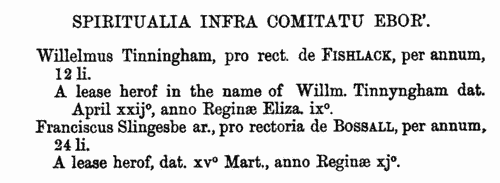
| Citizens of Oxford
(1509-1583)
These selections from the Oxford city records were printed in 1880 under the direction of the Town Clerk. Much of the material comes from the council minutes: 24 common councillors were elected out of the citizens at large each 30 September. Apart from the general administration of the city, a large number of cases involve people brought before the Council for using improper language, or other misbehaviour. There is an almost unbroken series of hanasters, or admissions to freedom of the city, listing the names of those who by purchase, birth or apprenticeship were admitted to the guild merchant.THOMSON. Cost: £4.00.  | Sample scan, click to enlarge
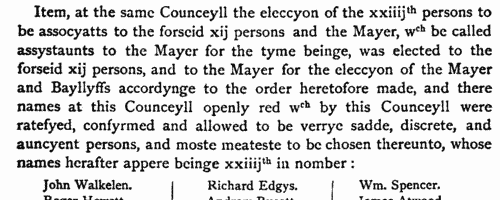
| Yorkshire Feet of Fines
(1571-1584)
Pedes Finium - law suits, or pretended suits, putting on record the ownership of land in YorkshireTHOMSON. Cost: £4.00.  | Sample scan, click to enlarge

|
Research your ancestry, family history, genealogy and one-name study by direct access to original records and archives indexed by surname.
|












